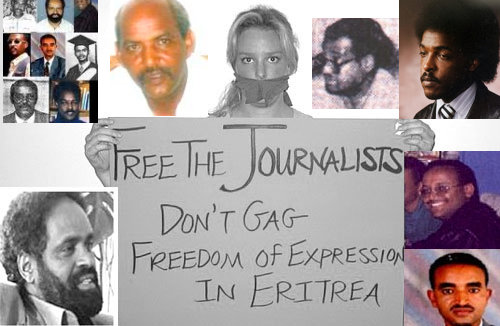Eritrea: Over a Decade of Media Persecution
by Eoin Koepfinger / February 17, 2012 / No comments
Last month, for the fifth year in a row, Reporters Without Borders (RSF) ranked Eritrea the lowest out of 179 countries on its annual Press Freedom Index. This puts Eritrea lower than North Korea (which is 178) and several places below other countries like Syria, Iran, and China whose lack of press freedom is widely known. Eritrea may not command as much international attention as the aforementioned regimes, but conditions are no less appalling in the 19-year-old African nation that RSF has called an “absolute dictatorship” and Human Rights Watch has concluded is “one of the world’s most repressive governments.”
Eritrea is a closed society, ruled by President Isaias Afewerki since Eritrea’s secession from Ethiopia in 1991 (it gained official independence in 1993). Alongside a litany of human rights abuses, Eritrea is perhaps most notable for its lack of any private, independent media outlets. After a crackdown on all explicit and perceived opposition to Afewerki’s rule in September of 2001, the only media allowed in Eritrea are all owned by the government. However, the 2001 crackdown was not limited to pressure on journalists. Government officials, leaders of government-controlled labor unions, businesspeople, and national service evaders were also imprisoned.
While the number of Eritreans jailed for opposition is difficult to confirm, Human Rights Watch estimates the total since September 2001 ranges from 5,000 to 10,000, excluding national service evaders and deserters, who may number tens of thousands more. Most arrestees are never formally charged or given a chance to defend themselves. There are no public trials and no chances for appeal. Appalling prison conditions, including torture, malnutrition, and exposure to temperature extremes are the norm. Numerous journalists have fled, but families of arrestees and defectors can also face government persecution, fines, or imprisonment.
Among the list of prominent journalists who have been imprisoned is Dawit Isaac, a dual Swedish-Eritrean citizen who was an early member of the now-defunct Eritrean newspaper Setit. After his arrest in 2001, Isaac was held without charge until being released in 2005. Two days later he was detained again and remains in prison. Eritrean Information Minister Ali Abdu later stated that Isaac had only been released temporarily for a medical checkup.
Isaac has been the subject of an international amnesty campaign, partly on the basis of his Swedish citizenship. The campaign for Isaac has also been a platform to address the plight of the other journalists imprisoned in Eritrea. But even reporters outside Eritrea covering his case have received threats and assaults from Afewerki supporters. Recently, Reporters Without Borders cast doubt on unconfirmed reports that Isaac had died in detention.
Dawit is not the only prisoner whose status is nebulous. Since prisoners are held incommunicado, the exact numbers of journalists believed to be imprisoned varies from source to source. CPJ has cited 17, while Reporters Without Borders lists a total of 34. Below is that list, but it may not account for those who have died or whose status is otherwise unknown.
Journalists Imprisoned in Eritrea: RSF 2012 Press Freedom Barometer
• Since : March 2011 – Tesfalidet Mebrahtu – Dimtsi Hafash, Eri-TV
• Since : 22 February 2011 – Nebiel Edris – Dimtsi Hafash – Arabic service
• Since : 22 February 2011 – Ahmed Usman – Dimtsi Hafash – Tigre service
• Since : 22 February 2011 – Mohamed Osman – Dimtsi Hafash – Bilen service
• Since : 30 July 2010 – Eyob Kessete – Radio Dimtsi Hafash, amharique service
• Since : 26 March 2010 – Said Abdulhai – Eritrea Profile – News Room
• Since : 22 February 2009 – Bereket Misghina – Radio Bana
• Since : 22 February 2009 – Yirgalem Fisseha Mebrahtu – Zemen, Radio Bana
• Since : 22 February 2009 – Basilios Zemo – Radio Bana
• Since : 22 February 2009 – Senait Habtu – Radio Dimtsi Hafash, service amharique
• Since : 22 February 2009 – Meles Negusse Kiflu – Radio Zara, Radio Bana
• Since : 22 February 2009 – Mohammed Said Mohammed – Radio Bana
• Since : 22 February 2009 – Biniam Ghirmay – Radio Bana
• Since : 22 February 2009 – Esmail Abd-el-Kader – Radio Bana
• Since : 22 February 2009 – Araya Defoch – Radio Bana
• Since : 22 February 2009 – Mohammed Dafla – Radio Bana
• Since : 22 February 2009 – Simon Elias – Radio Bana
• Since : 22 February 2009 – Yemane Hagos – Radio Bana
• Since : February 2009 – Girmay Abraham – Dimtsi Hafash
• Since : 2008 – Isaac Abraham – Eri TV
• Since : 2008 – Mulubrhan Habtegebriel – Meqalih, Setit, Radio Zara, Hadas Eritrea
• Since : December 2007 – Nega Woldegeorgis – Radio Zara, Dimtsi Hafash, Hadas Eritrea
• Since : 12 March 2007 – Identité inconnue – Hadas Eritrea
• Since : 2007 – Eyob Netserab – Radio Dimtsi Hafash, service en amharique
• Since : 12 November 2006 – Daniel Mussie – Radio Dimtsi Hafash, service en oromo
• Since : February 2002 – Hamid Mohamed Said – Eri-TV
• Since : February 2002 – Saleh Al Jezaeeri – Radio Dimtsi Hafash
• Since : 21 September 2001 – Seyoum Tsehaye – indépendant
• Since : 20 September 2001 – Temesgen Gebreyesus – Keste Debena
• Since : 19 September 2001 – Mattewos Habteab – Meqaleh
• Since : 18 September 2001 – Emanuel Asrat – Zemen
• Since : 18 September 2001 – Dawit Isaac – Setit
• Since : September 2001 – Dawit Habtemichael – Meqaleh
• Since : 2000 – Wedi Itay – Freelance
In 2008, Press Freedom Institute provided brief profiles on some of the prominent imprisoned journalists.
Those looking to help can visit the Free Dawit campaign website.
For more frequent news on issues in Eritrea, visit Radio Erena, an international, independent news station founded by exiled Eritrean journalists.





